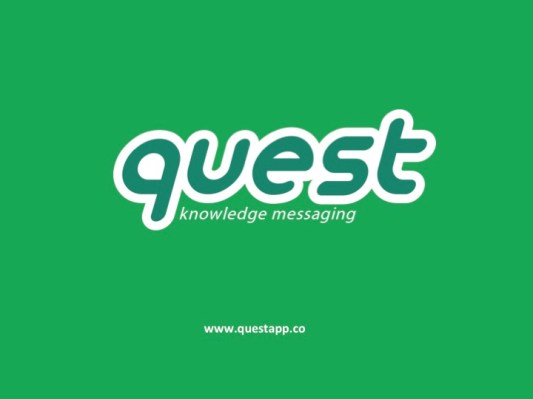Co-founders of Innoz, an SMS-based offline search engine in India that has answered over 1 billion queries on mobile phones, are raising $500,000 in Seed funding from 500 Startups and other angel investors to build a Jelly-like app targeted at the U.S. market. The app is called Quest and it’s currently available on Android. An iOS version will be out in few days.
Quest will combine its question-and-answer platform with automatic geotagging to help users find nearby people who can answer questions on the best restaurants to dine, places to see around, and so on. Unlike Jelly, which seeks answers from existing social networks like Facebook and Twitter users, Quest plans to build its own registered community of users who will help each other with what they know the best.
The founders — Deepak Ravindran and Mohammed Hisamuddin — are relocating from their Bangalore offices to join 500 Startups’ latest batch starting this February. The duo have already got AltaVista founder Louis Monier, Pranav Mistry (director of research at Samsung) and Asha Jadeja, an angel investor, as advisors on the board.
“Quest is a people powered answering app where the human mind will be the algorithm behind our answers. It is a natural transition for us from SMS Search to Quest, because we will still be doing what we love the most — answering people’s queries, albeit with a personal touch,” said Deepak.
Both Deepak and Hisamuddin declined to offer comments on the specific investors.
Another important development as part of their new gig is that the founders are buying back their stakes in Innoz from the only external investor, Seedfund, that had invested around $3 million in the company. Again, the founders requested not to be quizzed on the specifics of this buyback. Innoz has been profitable for last three years and is expected to report revenues of around $4 million this year. So a buyback does not seem that difficult to pull off.
At the outset, comparing an unknown startup with Jelly might sound like a wild idea, especially since Jelly is the brainchild of Twitter co-founder Biz Stone, and is perhaps among the hottest startups in the Valley today (going by the profile of early users that include Mark Zuckerberg).
There are many things that Quest does differently and perhaps Jelly promises to do much better, but both of them are aimed at leveraging networks of real people to answer questions. For its part, Jelly taps into the existing social networks like Facebook and Twitter to fetch answers from a user’s followers.
Quest, on the other hand, aims to stay away from existing social networks by leveraging location-based geotagging to identify users who are best positioned to answer a question. The questions will also be tagged according to different topics and interest areas. After a question is posted, it will be routed to the people who can answer it the best.
Also, while Jelly asks users to pose visual questions, Quest would be text-based with additional capabilities that will allow people to include pictures, and even video in future, the founders said.
So how does Quest match questions with the best possible answers?
At the back-end, Quest’s algorithm (yes, despite their ‘human focus’ both Jelly and others rely on algorithms) will route questions tagged by location or topic based on profiles and interests of its users.
“The best and quickest way to get the answer for a question is to ask the friend who are with you at that moment, only then do we turn to Google and other sources. Quest leverages this and pushes your questions intelligently to people around you and gets back you an answer instantly,” Ravindran said.
As TechCrunch’s Sarah Perez argued yesterday, Jelly’s novelty may be wearing off, especially if you look at the quality of questions and answers.
And that’s a challenge for not just Jelly, but many other attempts in building a fool-proof Q&A service.
The Innoz founders were inspired to build Quest after realizing that despite handling over 1 billion questions on mobiles, the quality and accuracy of answers remained a huge concern. In a blog post on Medium, Hisamuddin said Innoz failed to deliver 100% accurate answers (and the same can be said of Google search too).
And what happens to Innoz?
When I asked the founders about road ahead for Innoz, they maintained that it’s not shutting down or such, but will remain a separate entity for now.
“In a course of 5 years, our dorm room idea has grown to a perfect telecom product. Millions of people have used our service and have benefited from it. After successfully running the company profitable for the last three years, we’ve decided to launch Quest,” Deepak said.
Innoz was founded in 2009 by Deepak, Mohammed, Ashwin Nath and Abhinav Sree — who all dropped out of a college in the Indian state of Kerala to become entrepreneurs. Last year, the company earned around $3 million in revenue and is expected to post around $4 million during financial year ending March 2014.
